Module 1 British and American English Words Reading and Vocabulary
文档属性
| 名称 | Module 1 British and American English Words Reading and Vocabulary |
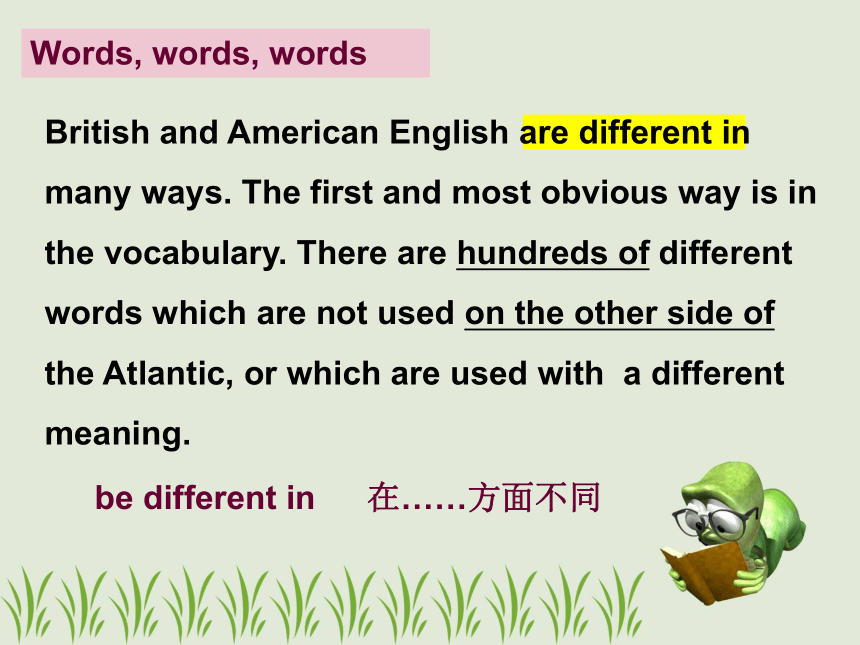
|
|
| 格式 | rar | ||
| 文件大小 | 301.3KB | ||
| 资源类型 | 教案 | ||
| 版本资源 | 外研版 | ||
| 科目 | 英语 | ||
| 更新时间 | 2011-06-02 00:00:00 | ||
图片预览

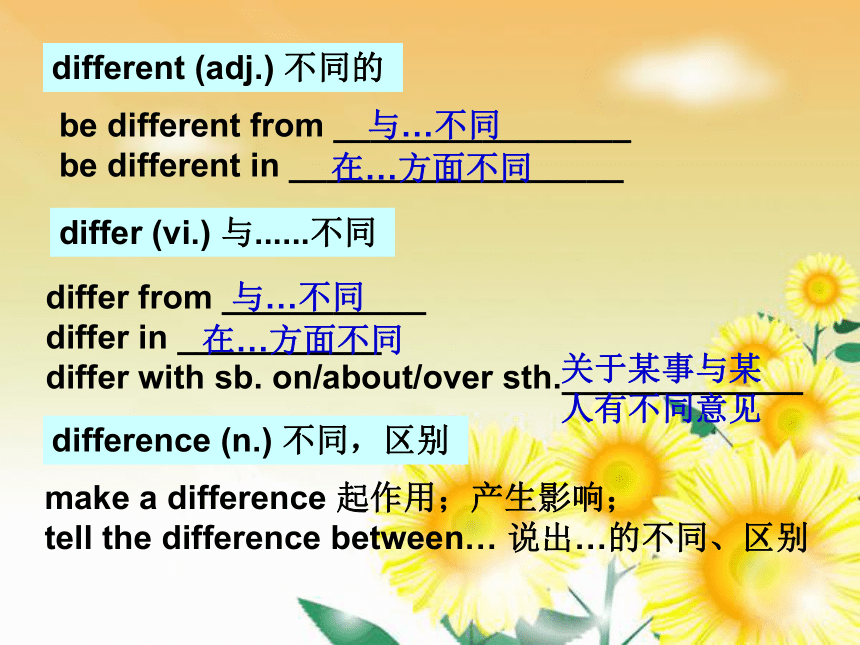
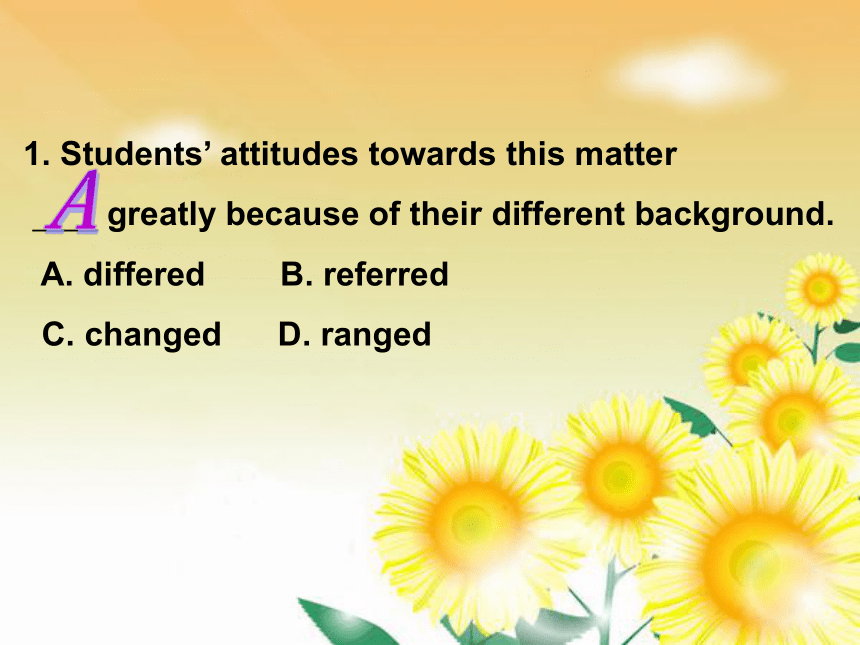
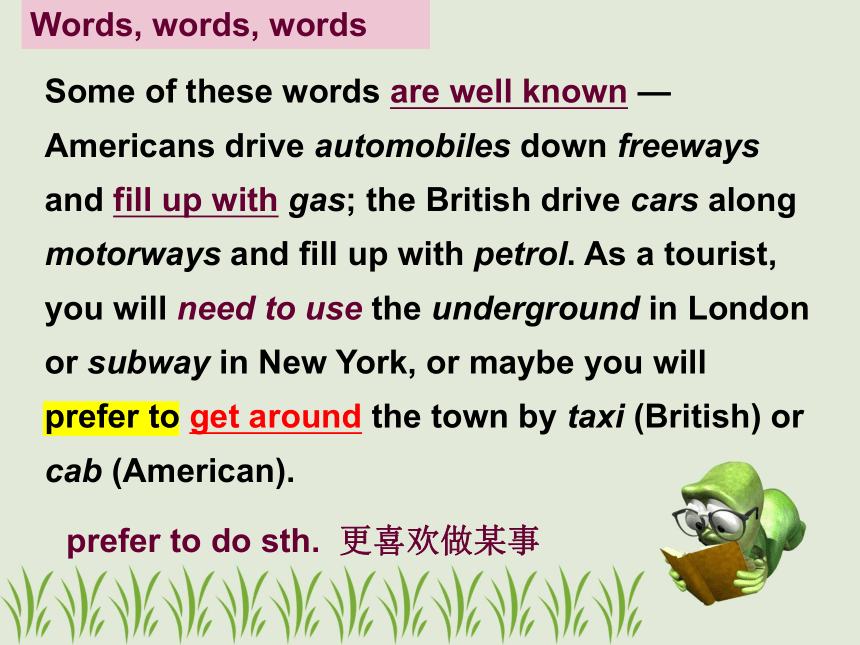
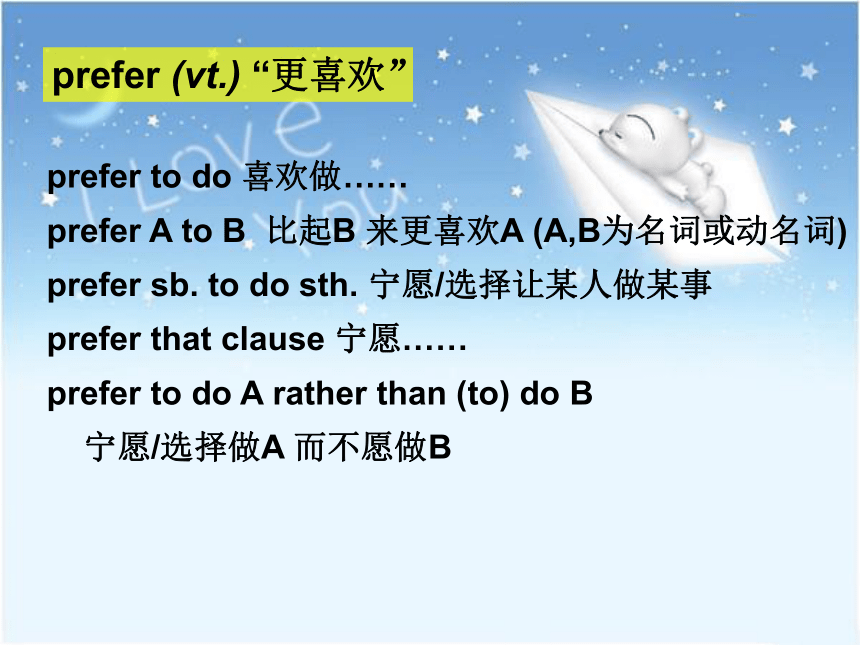
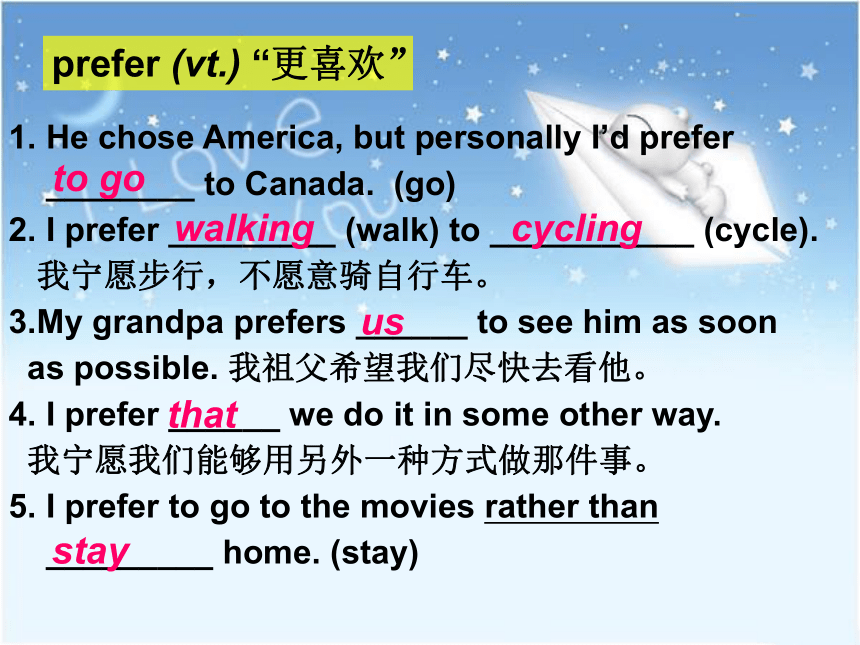
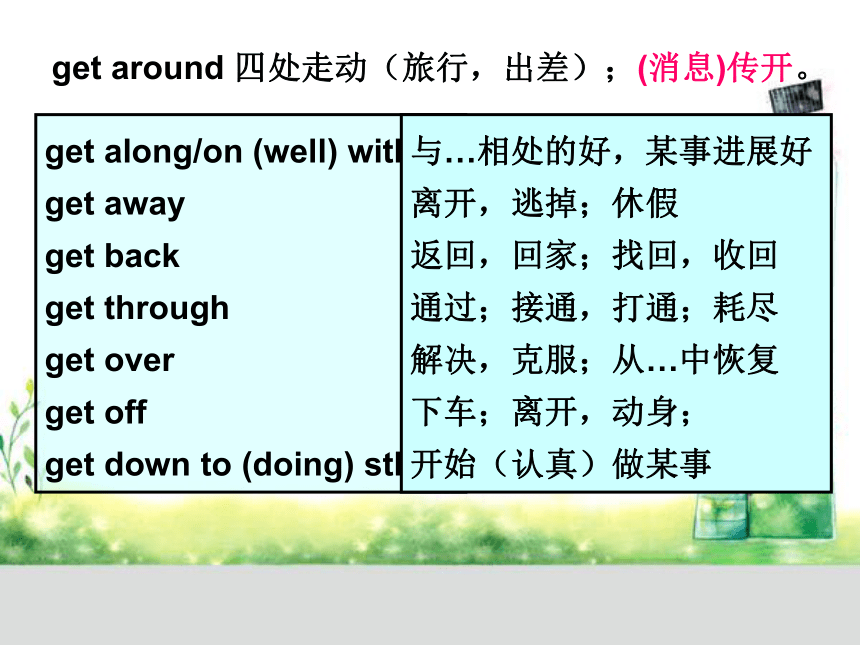
文档简介
(共16张PPT)
Words, words, words
British and American English are different in
many ways. The first and most obvious way is in
the vocabulary. There are hundreds of different
words which are not used on the other side of
the Atlantic, or which are used with a different
meaning.
be different in
在……方面不同
different (adj.) 不同的
differ (vi.) 与......不同
differ from ___________
differ in ___________
differ with sb. on/about/over sth._____________
difference (n.) 不同,区别
make a difference 起作用;产生影响;
tell the difference between… 说出…的不同、区别
be different from ________________
be different in __________________
与…不同
在…方面不同
与…不同
在…方面不同
关于某事与某人有不同意见
1. Students’ attitudes towards this matter
greatly because of their different background.
A. differed B. referred
C. changed D. ranged
Some of these words are well known —
Americans drive automobiles down freeways
and fill up with gas; the British drive cars along
motorways and fill up with petrol. As a tourist,
you will need to use the underground in London
or subway in New York, or maybe you will
prefer to get around the town by taxi (British) or
cab (American).
Words, words, words
prefer to do sth. 更喜欢做某事
prefer (vt.) “更喜欢”
prefer to do 喜欢做……
prefer A to B 比起B 来更喜欢A (A,B为名词或动名词)
prefer sb. to do sth. 宁愿/选择让某人做某事
prefer that clause 宁愿……
prefer to do A rather than (to) do B
宁愿/选择做A 而不愿做B
prefer (vt.) “更喜欢”
1. He chose America, but personally I’d prefer
________ to Canada. (go)
2. I prefer _________ (walk) to ___________ (cycle).
我宁愿步行,不愿意骑自行车。
3.My grandpa prefers ______ to see him as soon
as possible. 我祖父希望我们尽快去看他。
4. I prefer ______ we do it in some other way.
我宁愿我们能够用另外一种方式做那件事。
5. I prefer to go to the movies rather than
_________ home. (stay)
to go
walking
cycling
us
that
stay
get around 四处走动(旅行,出差);(消息)传开。
get along/on (well) with…
get away
get back
get through
get over
get off
get down to (doing) sth.
与…相处的好,某事进展好
离开,逃掉;休假
返回,回家;找回,收回
通过;接通,打通;耗尽
解决,克服;从…中恢复
下车;离开,动身;
开始(认真)做某事
It was not a serious illness, and she
soon it.
A. got over B. got on with
C. got around D. got out of
Chips or French fries
But other words and expressions are not so well
known. Americans use a flashlight, while for the
British, it’s a torch. The British queue up;
Americans stand in line. Sometimes the same
word has a slightly different meaning, which can
be confusing.
while此处意为“而,然而”,引导并列句,
表示前后两部分的对比。一般位于句中。
while 除此用法,还有以下三种用法
① 引导时间状语从句,意为“当......的时候”,此时从句
的谓语动词通常是延续性动词。
e.g. While he was reading the newspaper, he heard
someone knock at door.
② 表示让步,通常位于句首,意为“尽管;虽然”,
相当于although 或 though。
e.g. While I agree with your reasons, I can’t allow it.
尽管我同意你的理由但不允许你这样做。
① She thought I was talking about her daughter,
, in fact, I was talking about my daughter.
A. whom B. where C. which D. while
③ 表示条件 ,“只要”,其意思和用法相当于as long as, while 可位于句首或句中。
e.g. While there is life, there is hope.
留得生命在,不怕没希望。
Chips, for example, are pieces of hot fried potato
in Britain; in the States chips are very thin and
are sold in packets. The British call these crisps.
The chips the British know and love are French
fries on the other side of the Atlantic.
Chips or French fries
省略that/ which的定语从句,修饰chips
There are a few differences in grammar, too. The
British say Have you got… while Americans
prefer Do you have… An American might say My
friends just arrived, but a British person would
say My friend has just arrived.
Have or have got
Prepositions, too, can be different: compare on
the team, on the weekend (American) with in the
team, at the weekend (British). The British use
prepositions where Americans sometimes omit
them (I’ll see you Monday; Write me soon!).
Have or have got
compare vt./ vi. 作及物动词时意为“把......和......比较”
作不及物动词时意为“匹敌,可与......相比”
其名词为:comparison 意为“比较,对比”。
compare A with B
compare A to B
compared with/ to + n. 在句中作状语,
为固定用法,无须分析与主句的关系是主动还是被动
把A 和B 进行比较
把A 比作B
与......相比
Don’t compare your disadvantages _______others’
strong points.
不要拿你的缺点和别人的优点相比。
Man’s life is often compared _______ a candle.
人生常被比喻成蜡烛。
________ _____ Beijing, I like Shanghai better.
与北京相比,我更喜欢上海。
with
to
Compared with/ to
Words, words, words
British and American English are different in
many ways. The first and most obvious way is in
the vocabulary. There are hundreds of different
words which are not used on the other side of
the Atlantic, or which are used with a different
meaning.
be different in
在……方面不同
different (adj.) 不同的
differ (vi.) 与......不同
differ from ___________
differ in ___________
differ with sb. on/about/over sth._____________
difference (n.) 不同,区别
make a difference 起作用;产生影响;
tell the difference between… 说出…的不同、区别
be different from ________________
be different in __________________
与…不同
在…方面不同
与…不同
在…方面不同
关于某事与某人有不同意见
1. Students’ attitudes towards this matter
greatly because of their different background.
A. differed B. referred
C. changed D. ranged
Some of these words are well known —
Americans drive automobiles down freeways
and fill up with gas; the British drive cars along
motorways and fill up with petrol. As a tourist,
you will need to use the underground in London
or subway in New York, or maybe you will
prefer to get around the town by taxi (British) or
cab (American).
Words, words, words
prefer to do sth. 更喜欢做某事
prefer (vt.) “更喜欢”
prefer to do 喜欢做……
prefer A to B 比起B 来更喜欢A (A,B为名词或动名词)
prefer sb. to do sth. 宁愿/选择让某人做某事
prefer that clause 宁愿……
prefer to do A rather than (to) do B
宁愿/选择做A 而不愿做B
prefer (vt.) “更喜欢”
1. He chose America, but personally I’d prefer
________ to Canada. (go)
2. I prefer _________ (walk) to ___________ (cycle).
我宁愿步行,不愿意骑自行车。
3.My grandpa prefers ______ to see him as soon
as possible. 我祖父希望我们尽快去看他。
4. I prefer ______ we do it in some other way.
我宁愿我们能够用另外一种方式做那件事。
5. I prefer to go to the movies rather than
_________ home. (stay)
to go
walking
cycling
us
that
stay
get around 四处走动(旅行,出差);(消息)传开。
get along/on (well) with…
get away
get back
get through
get over
get off
get down to (doing) sth.
与…相处的好,某事进展好
离开,逃掉;休假
返回,回家;找回,收回
通过;接通,打通;耗尽
解决,克服;从…中恢复
下车;离开,动身;
开始(认真)做某事
It was not a serious illness, and she
soon it.
A. got over B. got on with
C. got around D. got out of
Chips or French fries
But other words and expressions are not so well
known. Americans use a flashlight, while for the
British, it’s a torch. The British queue up;
Americans stand in line. Sometimes the same
word has a slightly different meaning, which can
be confusing.
while此处意为“而,然而”,引导并列句,
表示前后两部分的对比。一般位于句中。
while 除此用法,还有以下三种用法
① 引导时间状语从句,意为“当......的时候”,此时从句
的谓语动词通常是延续性动词。
e.g. While he was reading the newspaper, he heard
someone knock at door.
② 表示让步,通常位于句首,意为“尽管;虽然”,
相当于although 或 though。
e.g. While I agree with your reasons, I can’t allow it.
尽管我同意你的理由但不允许你这样做。
① She thought I was talking about her daughter,
, in fact, I was talking about my daughter.
A. whom B. where C. which D. while
③ 表示条件 ,“只要”,其意思和用法相当于as long as, while 可位于句首或句中。
e.g. While there is life, there is hope.
留得生命在,不怕没希望。
Chips, for example, are pieces of hot fried potato
in Britain; in the States chips are very thin and
are sold in packets. The British call these crisps.
The chips the British know and love are French
fries on the other side of the Atlantic.
Chips or French fries
省略that/ which的定语从句,修饰chips
There are a few differences in grammar, too. The
British say Have you got… while Americans
prefer Do you have… An American might say My
friends just arrived, but a British person would
say My friend has just arrived.
Have or have got
Prepositions, too, can be different: compare on
the team, on the weekend (American) with in the
team, at the weekend (British). The British use
prepositions where Americans sometimes omit
them (I’ll see you Monday; Write me soon!).
Have or have got
compare vt./ vi. 作及物动词时意为“把......和......比较”
作不及物动词时意为“匹敌,可与......相比”
其名词为:comparison 意为“比较,对比”。
compare A with B
compare A to B
compared with/ to + n. 在句中作状语,
为固定用法,无须分析与主句的关系是主动还是被动
把A 和B 进行比较
把A 比作B
与......相比
Don’t compare your disadvantages _______others’
strong points.
不要拿你的缺点和别人的优点相比。
Man’s life is often compared _______ a candle.
人生常被比喻成蜡烛。
________ _____ Beijing, I like Shanghai better.
与北京相比,我更喜欢上海。
with
to
Compared with/ to
